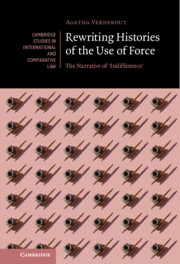Book contents
- Rewriting Histories of the Use of Force
- Cambridge Studies in International and Comparative Law: 160
- Rewriting Histories of the Use of Force
- Copyright page
- Contents
- Foreword
- Acknowledgements
- Abbreviations
- Introduction
- Part I The Use of Force in Nineteenth-Century Doctrine
- 1 The ‘Use of Force’ in the Nineteenth Century
- 2 The Use of Force in Writings of ‘Naturalist’ Inclination
- 3 The Use of Force in Writings of ‘Eclectic’ Inclination
- 4 The Use of Force in Writings of ‘Positivistic’ Inclination
- Conclusion of Part I
- Part II The Use of Force in Nineteenth-Century Practice
- Part III The Narrative of Indifference in the Twentieth Century
- Conclusion
- Bibliography
- Index
- Cambridge Studies in International and Comparative Law
2 - The Use of Force in Writings of ‘Naturalist’ Inclination
from Part I - The Use of Force in Nineteenth-Century Doctrine
Published online by Cambridge University Press: 10 September 2021
- Rewriting Histories of the Use of Force
- Cambridge Studies in International and Comparative Law: 160
- Rewriting Histories of the Use of Force
- Copyright page
- Contents
- Foreword
- Acknowledgements
- Abbreviations
- Introduction
- Part I The Use of Force in Nineteenth-Century Doctrine
- 1 The ‘Use of Force’ in the Nineteenth Century
- 2 The Use of Force in Writings of ‘Naturalist’ Inclination
- 3 The Use of Force in Writings of ‘Eclectic’ Inclination
- 4 The Use of Force in Writings of ‘Positivistic’ Inclination
- Conclusion of Part I
- Part II The Use of Force in Nineteenth-Century Practice
- Part III The Narrative of Indifference in the Twentieth Century
- Conclusion
- Bibliography
- Index
- Cambridge Studies in International and Comparative Law
Summary
This chapter is the first of three attempts to question the assertion according to which nineteenth century authors who claimed international law ring-fenced the use of force were 'naturalists'. It is divided into four sections: The first seeks to evidence how authors that can be labelled as 'naturalists' construed the international legal order. It shows that they did not dismiss positive law but believed natural law to be normatively superior. The second investigates how this translated in terms of method for the identification and determination of custom. ‘Naturalist’ authors adopted a two-step approach which consisted in analyzing State practice in order to identify potential customary rules and then test them against ‘necessary’ principles in order to confirm their normative value. The third and fourth sections respectively try to see how this method was applied to establish the existence of a rule of non-intervention and the exceptions to said principle. Non-intervention was deduced from the natural principles of independence and equality. Practice was more extensively taken into account to establish the cases in which States could resort to force.
Keywords
- Type
- Chapter
- Information
- Rewriting Histories of the Use of ForceThe Narrative of ‘Indifference', pp. 36 - 56Publisher: Cambridge University PressPrint publication year: 2021

